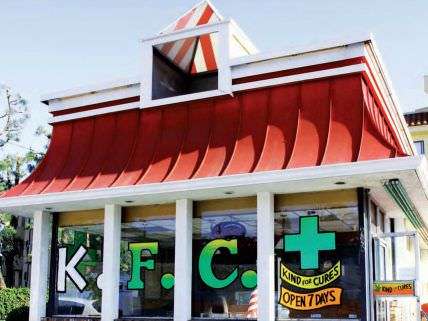California Legislators Plan to Approve Medical Marijuana Regulation by Midnight
Spurred by a general legalization initiative, the bills would explicitly allow commercial cultivation and distribution for the first time.

Almost two decades after Californians approved the medical use of marijuana, state legislators are suddenly rushing to regulate the quasi-legal, semi-legitimate industry that emerged from that historic vote. Last night the authors of three bills that would establish state rules for growing and distributing medical marijuana announced that legislative leaders and Gov. Jerry Brown had reached agreement on a package that both houses will have to pass by the end of today.
The legislation creates a Bureau of Medical Marijuana Regulation within the Department of Consumer Affairs that will be charged with licensing and regulating growers, processors, and retailers. Patients will still be allowed to grow their own medicine, but dispenaries operating as patient collectives or cooperatives will be replaced by state-licensed businesses within a year after licenses become available. Cities and counties will be allowed to impose special taxes (in addition to standard sales taxes) on production and sale of medical marijuana, subject to approval by local voters. The plan includes a "seed-to-sale" monitoring system similar to those adopted by Colorado and Washington, aimed at preventing diversion to nonmedical use.
Although California was the first state to pass a medical marijuana ballot initiative, back in 1996, it has never managed to specify where and how patients can obtain their medicine if they are not up to growing it themselves and cannot find a "primary caregiver" who is willing and able to do it for them. As other states began regulating medical marijuana growers and distributors, California's dispensaries continued to operate in a legal gray area, inviting local and federal crackdowns.
Many dispensaries initially claimed to be their customers' "primary caregivers," a legal rationale that was rejected by the California Supreme Court in 2008. Then dispensaries took refuge in a provision of the 2004 Medical Marijuana Program Act that says patients may "associate within the State of California in order collectively or cooperatively to cultivate marijuana for medical purposes." In 2008 Brown, then California's attorney general, issued guidelines for marijuana distribution by nonprofit collectives, but neither they nor commercial distributors were ever explicitly authorized by state law.
Over the years legislators have repeatedly tried to regulate medical marijuana. But as The Sacramento Bee notes, those efforts were defeated by "internal squabbling from industry groups, law enforcement objections and resistance by fearful lawmakers." The latest impetus comes from the prospect of a ballot initiative that may very well legalize marijuana for recreational use next year. California legislators would like to avoid what happened in Washington, where a state-licensed recreational industry was created alongside an unlicensed but arguably legal medical industry, a situation that politicians inevitably deemed untenable.
"In 1996 California became the first state in the nation to allow the use of medical marijuana after voters approved Proposition 215," says Assemblymember Reginald Byron Jones-Sawyer (D-Los Angeles), co-author of one medical marijuana bill. "This unprecedented collaborative effort will finally, after 19 years, regulate the medical marijuana industry. A.B. 266 creates a regulatory system that respects the interests of local government while still providing a consistent statewide structure."


Show Comments (5)